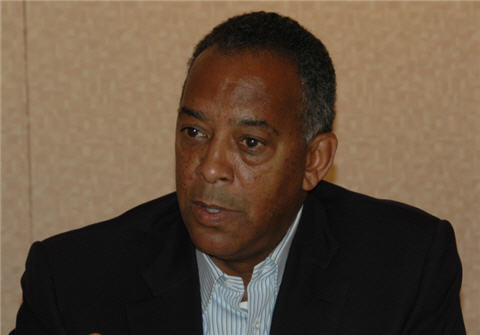Symantec CEO John Thompson on Microsoft, Google and Switzerland

Symantec CEO John Thomspon drinks deeply from the Microsoft well. In fact, three-quarters of his company's $5.2 billion in revenue last year was derived from the Windows platform. But Symantec's relationship with Microsoft is complex and at times contentious. Thompson describes Microsoft as a partner, ally and competitor.
On the competitor front, he has not been shy about criticizing Microsoft's effort to move into the security space.
Regarding Windows Vista, Thompson has said:
Consumers should not be confused. Vista is not a security solution. Vista is an operating system, and Vista provides some very important advances from Microsoft's perspective and for the industry's point of view on building a more stable, more reliable, more secure operating platform, but people still need the efficacy that comes with the products that Symantec and others in the industry build, and so we should not be confused by the marketing rhetoric with what Vista is. It's a hopefully much better product than XP or any of its predecessors, but it's not a security solution.
Microsoft has a consumer security offering, Windows Live OneCare, but Thompson dismissed it as a worthy competitor. Like Symantec's Norton 360 product, OneCare includes antivirus, antispyware, antiphishing, firewall, performance tune-up and backup and restore capabilities.
"What Microsoft is doing in the security space has been more hype than hurt," Thompson said during interview with a few members of the press today at Symantec's Cupertino, CA headquarters. "Microsoft's presence in the consumer marketplace has been resoundingly heralded as a non-event by most in the industry. It's not proven if customers will accept it."
Thompson's biased and pragmatic point of view is that customers need choice--more diversity in the gene pool, as he put it--and a marketplace open to innovation and ideas about how the Microsoft platform should be secured. He cited recent victories over Microsoft, such as getting Microsoft to back off from making Windows Security Center the default for Vista and giving trusted applications access to the Windows kernel.
He offered his ideal for a Microsoft not focused on endpoint security products. "Microsoft should do more to shore up [the Windows platform] and expand its applications instead of playing around in the security space, or make more investments in service delivery, with software-as-a-service, or worry about the juggernaut Google."
Of course, he doesn't expect Microsoft to roll over and let Symantec and its peers like McAfee own the security market for Windows. "We are sufficiently paranoid not to assume Microsoft will give in. Steve [Ballmer] has not made a call to me saying that he gives in," Thompson said.
He also talked about the shift to the software-as-a-service hosting and business model. "I don't believe the world goes all hosted. Remember the pundits declaring the mainframe is dead. I am not a believer in declarative statements made by many of soothsayers," Thompson said.
Symantec expects to introduce its first software-as-a-service offering, a backup, subscription-based service dubbed Symantec Network Protection aimed at small- and medium-sized businesses, before the end of this year. Pricing will be based on the amount of data and length of retention.
The company is building its own datacenter to support hosted applications and partnering on a redundant facility. "We are building an overall platform that allows us to launch multiple applications, a provisioning, hosting and billing platform," said Greg Hughes, group president of Symantec Global Services. The company plans to offer a hosted messaging "hygiene" service, which handles antispam and email archiving, in 2008.
Regarding Google's acquisition of security providers GreenBorder and Postini, Thompson said that GreenBorder isn't yet competitive with Symantec in terms of protecting Web site. "[Google's acquisitions] are consistent with our view of what is going in Web," Thompson said. "The search business can be extended to embed capabilities in the Google toolbar or browser plug-ins. It will aid what users in they are trying to do on Web. How far Google goes remains to be seen."
Postini's hosted suite of security services for messaging is more directly competitive with Symantec's enterprise security products, but Google lacks the broad distribution ecosystem, he said. In the long term the channel will be less of a factor, as hosted solutions procured through self-service Web services take hold.
Fundamentally, Symantec wants to be the Switzerland of software infrastructure management, whether hosted or on premises. The company's software portfolio ranges from Symantec's core consumer and enterprise security products to the Veritas datacenter storage management to Altiris' endpoint management.
The common thread is that they work across the major consumer and enterprise platforms. While some business units, such as Altiris, are run as independent entities within the company, the goal over time is to flesh out the integration points among the portfolio to create a more coherent software infrastructure platform.
"We have said that with our portfolio we are not trying to replicate the Microsoft model, running the whole stack. We can concentrate on a collection of infrastructure software," Thompson said. "We are the only hardware and operating system agnostic player. We can build comparable functionality on every platform and give customers choice."
I asked Thompson, who has the demeanor and eloquence of a polished politician, if he might be interested in politics. Bush appointed Thompson to the National Infrastructure Advisory Committee (NIAC) in 2002, served as chair of the Silicon Valley Blue Ribbon Task Force on Aviation Security and Technology and is on the board of directors UPS, Seagate and Teach for America. "I love what I do and living in California," he replied. Perhaps the outcome of the 2008 election might change his outlook...
